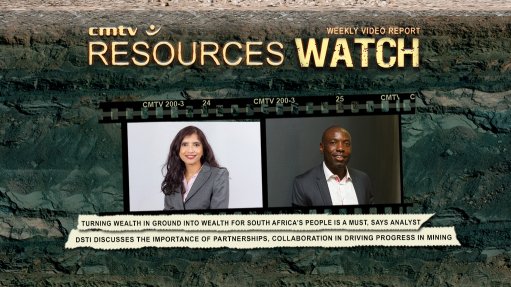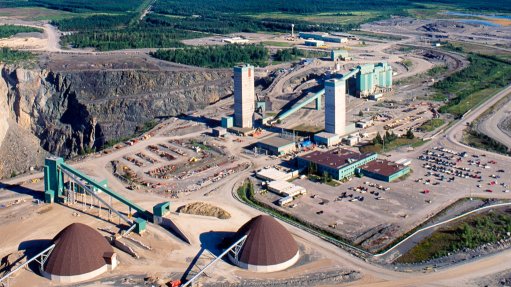Mining sector forges closer bond with First Nations
Canada is moving forward in its efforts to meet the needs of its indigenous peoples, with the mining sector playing a leading role.
Mining Association of Canada (MAC) president and CEO Pierre Gratton tells Mining Weekly that engagement and consultation with Aboriginal communities, also known as First Nations, are top priorities for the Canadian mining industry.
“We need to continue fostering a strong, progressive relationship with Aboriginal communities. Above and beyond following laws and regulations, and going through environmental review processes, it has become commonplace for mining companies to negotiate and conclude agreements (often called impact benefit agreements, or IBAs) with Aboriginal communities.
“These agreements can include commitments to jobs, training, business contracts, environmental agreements and financial payments. At present, about 318 agreements have been negotiated across the country, covering 185 different projects.”
Gratton says that of growing interest is the topic of resource revenue sharing, whereby governments commit to sharing mineral tax revenues with Aboriginal communities.
“MAC supports resource revenue sharing as it signals our deep respect for Aboriginal groups, recognises that mines are located on traditional lands, and helps support economic development in Aboriginal communities,” says Gratton.
He reports that proportionally, the mining industry is the largest private sector employer of Aboriginal Canadians and employment is poised to increase.
“About 1 200 Aboriginal communities are located within 200 km of some 180 producing mines and more than 2 500 active exploration properties. This makes this demographic ideally situated to access emerging employment opportunities in the mining industry.”
Gratton emphasises that the key to increasing the number of Aboriginal Canadians into well-paying mining jobs lies in skills training.
“As such, dedicated government support for such initiatives is crucial. The recent discontinuation of the Aboriginal Skills and Employment Partnership programme has created a gap that needs to be filled. We were pleased with the federal government’s continuation of the British Columbia Aboriginal Mining Training Association, but more needs to be done,” says Gratton.
Prospectors and Developers Association of Canada (PDAC) president Glenn Nolan tells Mining Weekly that exploration and mining is a primary engine for socioeconomic development in Aboriginal communities and mining represents one of the few economic oppor- tunities in many parts of Canada that can support business development, jobs, training, education and sustainable economic and community development.
“The PDAC actively promotes greater participation by Aboriginal peoples in the mineral industry as well as greater understanding and cooperation between Aboriginal communities and mineral exploration and mining companies,” says Nolan.
“We believe that a natural partnership exists between Aboriginal communities and the mineral industry due to the geographic location of many mineral exploration projects (such as in remote northern regions of the country) and isolated northern Aboriginal communities.”
He reports that many companies and communities in Canada are working together on formal and informal arrangements that lead to improved relations, regular engagement and business opportunities.
“These agreements are intended to ensure that Aboriginal peoples benefit from mining projects in their traditional areas and are accommodated for impacts of mine activities on their Aboriginal rights or treaty rights,” says Nolan.
He adds that in recent years, there have been increases in Aboriginal service com- panies, geologists, drillers, engineers, lawyers and labourers, as well as growth in com- munities that have their own mining or mining service companies.
“There are many examples of Aboriginal communities from across Canada that have embraced the opportunities in the mineral sector. They are the trailblazers for the communities that will follow.
“The next step in the evolution for Aboriginal participation in the mineral industry is to increase involvement to the point where communities and their members have the capacity to do initial exploration, secure mineral titles, seek partners and develop publicly traded companies,” says Nolan.
In January this year under the coordination of the Assembly of First Nations (AFN), the national organisation representing First Nations citizens, Canadian Prime Minister Stephen Harper met with First Nations leaders.
After the meeting AFN national chief Shawn A-in-chut Atleo reported that the Prime Minister listened respectfully to chiefs, responded to all they brought forward and for the first time, provided a clear mandate for high-level talks on Aboriginal treaty implementation.
He added that Harper also committed to high-level discussions on comprehensive claims and agreed that more central and political oversight was necessary to improve the relationships with First Nations.
Article Enquiry
Email Article
Save Article
Feedback
To advertise email advertising@creamermedia.co.za or click here
Press Office
Announcements
What's On
Subscribe to improve your user experience...
Option 1 (equivalent of R125 a month):
Receive a weekly copy of Creamer Media's Engineering News & Mining Weekly magazine
(print copy for those in South Africa and e-magazine for those outside of South Africa)
Receive daily email newsletters
Access to full search results
Access archive of magazine back copies
Access to Projects in Progress
Access to ONE Research Report of your choice in PDF format
Option 2 (equivalent of R375 a month):
All benefits from Option 1
PLUS
Access to Creamer Media's Research Channel Africa for ALL Research Reports, in PDF format, on various industrial and mining sectors
including Electricity; Water; Energy Transition; Hydrogen; Roads, Rail and Ports; Coal; Gold; Platinum; Battery Metals; etc.
Already a subscriber?
Forgotten your password?
Receive weekly copy of Creamer Media's Engineering News & Mining Weekly magazine (print copy for those in South Africa and e-magazine for those outside of South Africa)
➕
Recieve daily email newsletters
➕
Access to full search results
➕
Access archive of magazine back copies
➕
Access to Projects in Progress
➕
Access to ONE Research Report of your choice in PDF format
RESEARCH CHANNEL AFRICA
R4500 (equivalent of R375 a month)
SUBSCRIBEAll benefits from Option 1
➕
Access to Creamer Media's Research Channel Africa for ALL Research Reports on various industrial and mining sectors, in PDF format, including on:
Electricity
➕
Water
➕
Energy Transition
➕
Hydrogen
➕
Roads, Rail and Ports
➕
Coal
➕
Gold
➕
Platinum
➕
Battery Metals
➕
etc.
Receive all benefits from Option 1 or Option 2 delivered to numerous people at your company
➕
Multiple User names and Passwords for simultaneous log-ins
➕
Intranet integration access to all in your organisation


















